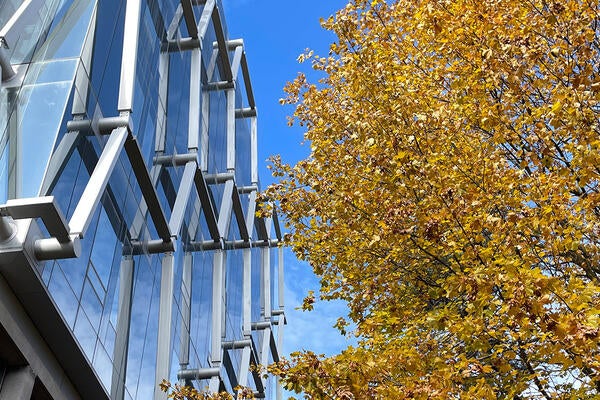
Improving solar technology to create a greener future
Engineering PhD candidate taking action on fossil fuel dependency shares concerns about climate change

Engineering PhD candidate taking action on fossil fuel dependency shares concerns about climate change
By Taylor Legere University RelationsWaterloo student says engineers have a responsibility to reduce fossil fuel dependency and negate global warming.
“It’s a responsibility that our grandchildren will look back on us and how we did in this moment in time,” said Khaled Ibrahim, engineering PhD candidate.
For Ibrahim, this means devoting his research to improving and implementing renewable energy sources.
Ibrahim is currently working to increase the efficiency of photovoltaic (PV) solar cells by creating novel materials from graphene and molybdenum disulfide. With the guidance of mechanical and mechatronics engineering Professors Mustafa Yavuz and Kevin Musselman, Ibrahim is completing his research in the Nano-Micro Systems Laboratory.
While Ibrahim’s focus is on solar technologies, the materials he is working with have several other applications including breast cancer detection and gas sensors.
Ibrahim began research on enhancing the performance of flat plate solar collectors while completing his undergrad in Cairo, Egypt. He then went on to do his masters and PhD research in the synthesis of high quality graphene to improve the efficiency of converting incident sunlight into electricity.
“My biggest concern is that we are still on an upwards trajectory in terms of our greenhouse gas emissions. The CO2 emissions now are still at an increase by two percent. We have not plateaued, we have not stopped increasing,” commented Ibrahim. “We have to start falling fast in terms of our greenhouse gas emissions.”
Although Ibrahim hopes to continue focusing on the implementation of green energy solutions post-graduation, he notes that application of the technology requires the support of policy makers and politicians as well.
“The best way to mitigate climate change is action, and not engineering action,” said Ibrahim. “All of the new technologies that can help us mitigate are already there. It just needs to be implemented.”
While attending the United Nations Climate Change Conference (COP23) in Bonn, Germany Ibrahim found the speaker Bertrand Piccard shared his views on the implementation gap.
Piccard is famed for being one of the first people to fly an entirely solar powered plane around the globe. Ibrahim notes that Piccard is just one person exemplifying the magnitude of the green technology already available.
One concern that Piccard and Ibrahim share is the lack of action and accountability being made by governments and policy makers.
“Targets for 2050 are too far away”, said Piccard at COP23. “They are set for 2050 because then nobody who is responsible now will be around by then.”
“There has to be an audit of some sort or a consequence for countries that are not following their Paris agreement targets,” said Ibrahim. “As historic and as amazing as the Paris agreement was – what is to stop them from not abiding to it? Nothing really.”
To really see change Ibrahim emphasises the need for everyone to make sustainability a priority and to hold their governments accountable to implement the green technology is already available today.
“I really do believe that the major driving force of this will be us,” said Ibrahim.

Read more
Here are the people and events behind some of this year’s most compelling Waterloo stories

Read more
15 University of Waterloo researchers have been named to the annual Highly Cited Researchers™ list for significant contributions to their specific fields of research

Read more
Twenty-six researchers receive federal funding to drive discovery, innovation and research infrastructure development
The University of Waterloo acknowledges that much of our work takes place on the traditional territory of the Neutral, Anishinaabeg, and Haudenosaunee peoples. Our main campus is situated on the Haldimand Tract, the land granted to the Six Nations that includes six miles on each side of the Grand River. Our active work toward reconciliation takes place across our campuses through research, learning, teaching, and community building, and is co-ordinated within the Office of Indigenous Relations.